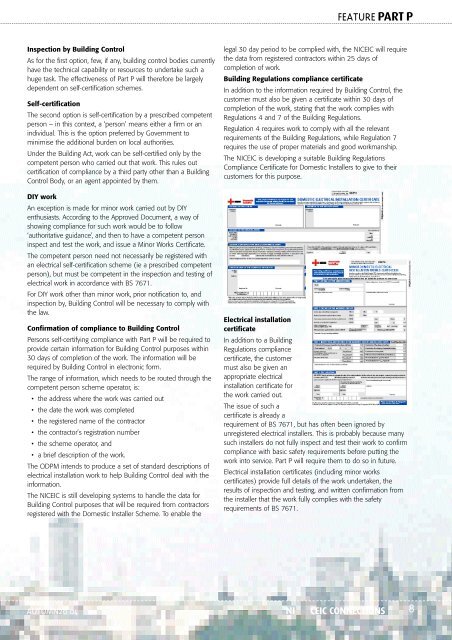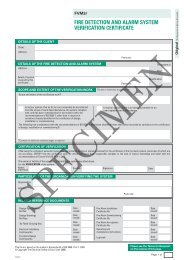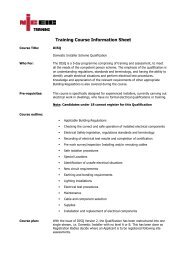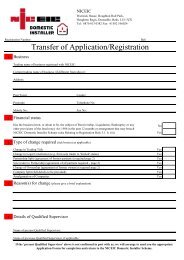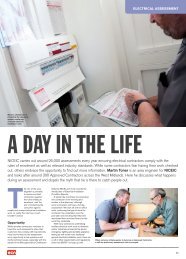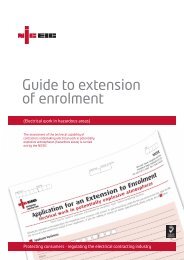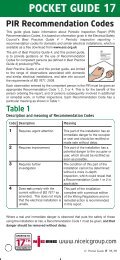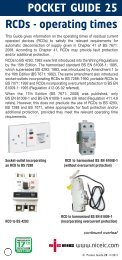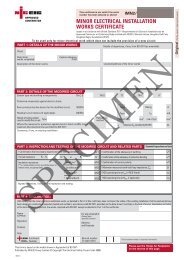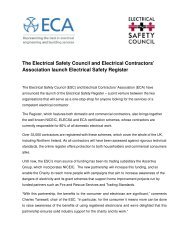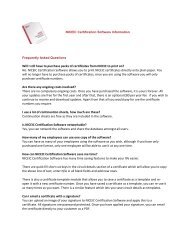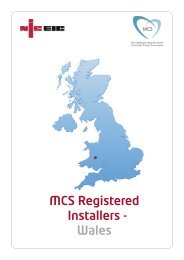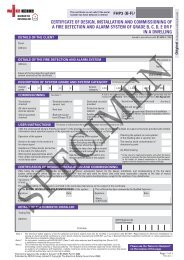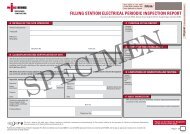PART P - NICEIC
PART P - NICEIC
PART P - NICEIC
Create successful ePaper yourself
Turn your PDF publications into a flip-book with our unique Google optimized e-Paper software.
FEATURE <strong>PART</strong> P<br />
Inspection by Building Control<br />
As for the first option, few, if any, building control bodies currently<br />
have the technical capability or resources to undertake such a<br />
huge task. The effectiveness of Part P will therefore be largely<br />
dependent on self-certification schemes.<br />
Self-certification<br />
The second option is self-certification by a prescribed competent<br />
person – in this context, a ‘person’ means either a firm or an<br />
individual. This is the option preferred by Government to<br />
minimise the additional burden on local authorities.<br />
Under the Building Act, work can be self-certified only by the<br />
competent person who carried out that work. This rules out<br />
certification of compliance by a third party other than a Building<br />
Control Body, or an agent appointed by them.<br />
DIY work<br />
An exception is made for minor work carried out by DIY<br />
enthusiasts. According to the Approved Document, a way of<br />
showing compliance for such work would be to follow<br />
‘authoritative guidance’, and then to have a competent person<br />
inspect and test the work, and issue a Minor Works Certificate.<br />
The competent person need not necessarily be registered with<br />
an electrical self-certification scheme (ie a prescribed competent<br />
person), but must be competent in the inspection and testing of<br />
electrical work in accordance with BS 7671.<br />
For DIY work other than minor work, prior notification to, and<br />
inspection by, Building Control will be necessary to comply with<br />
the law.<br />
Confirmation of compliance to Building Control<br />
Persons self-certifying compliance with Part P will be required to<br />
provide certain information for Building Control purposes within<br />
30 days of completion of the work. The information will be<br />
required by Building Control in electronic form.<br />
The range of information, which needs to be routed through the<br />
competent person scheme operator, is:<br />
• the address where the work was carried out<br />
• the date the work was completed<br />
• the registered name of the contractor<br />
• the contractor’s registration number<br />
• the scheme operator, and<br />
• a brief description of the work.<br />
The ODPM intends to produce a set of standard descriptions of<br />
electrical installation work to help Building Control deal with the<br />
information.<br />
The <strong>NICEIC</strong> is still developing systems to handle the data for<br />
Building Control purposes that will be required from contractors<br />
registered with the Domestic Installer Scheme. To enable the<br />
legal 30 day period to be complied with, the <strong>NICEIC</strong> will require<br />
the data from registered contractors within 25 days of<br />
completion of work.<br />
Building Regulations compliance certificate<br />
In addition to the information required by Building Control, the<br />
customer must also be given a certificate within 30 days of<br />
completion of the work, stating that the work complies with<br />
Regulations 4 and 7 of the Building Regulations.<br />
Regulation 4 requires work to comply with all the relevant<br />
requirements of the Building Regulations, while Regulation 7<br />
requires the use of proper materials and good workmanship.<br />
The <strong>NICEIC</strong> is developing a suitable Building Regulations<br />
Compliance Certificate for Domestic Installers to give to their<br />
customers for this purpose.<br />
Electrical installation<br />
certificate<br />
In addition to a Building<br />
Regulations compliance<br />
certificate, the customer<br />
must also be given an<br />
appropriate electrical<br />
installation certificate for<br />
the work carried out.<br />
The issue of such a<br />
certificate is already a<br />
requirement of BS 7671, but has often been ignored by<br />
unregistered electrical installers. This is probably because many<br />
such installers do not fully inspect and test their work to confirm<br />
compliance with basic safety requirements before putting the<br />
work into service. Part P will require them to do so in future.<br />
Electrical installation certificates (including minor works<br />
certificates) provide full details of the work undertaken, the<br />
results of inspection and testing, and written confirmation from<br />
the installer that the work fully complies with the safety<br />
requirements of BS 7671.<br />
AUTUMN 20 04 NI CEIC CO N N EC T I O N S 8


